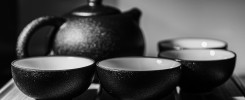When people ask me, “What is the healthiest black tea in the world?” my instinctive answer is, it depends on how you define healthy. After more than two decades working in tea cultivation, trading, and sensory evaluation, I’ve learned that health in tea is not just about antioxidant numbers or caffeine levels — it’s about origin, process, and how you drink it.
Let’s take a closer look from the perspective of someone who’s walked through tea gardens from Yunnan to Assam, and who has tasted thousands of teas at their source.
Table of Contents
1. Understanding What Makes a Black Tea ‘Healthy’
Before we crown a “healthiest” black tea, we need to understand what gives tea its health properties.
Black tea, or fully oxidized Camellia sinensis, contains polyphenols, flavonoids, and theaflavins — natural compounds that support cardiovascular health, aid digestion, and help fight oxidative stress.
However, these compounds vary greatly depending on:
- Cultivar: Different tea varieties have distinct chemical compositions.
- Altitude: Higher elevations tend to produce teas richer in antioxidants.
- Processing: Gentle oxidation and careful firing preserve nutrients better than industrial mass production.
In short, the “healthiest” tea isn’t always the most famous one — it’s the one that’s grown and processed with integrity.
2. The Top Contenders for the Healthiest Black Tea
After years of working with global tea markets and sourcing directly from farms, I believe several black teas stand out for their health potential and natural purity.
Darjeeling Black Tea (India)
Often called the “Champagne of Teas,” Darjeeling is grown at high altitudes in the foothills of the Himalayas. Its light, floral taste comes with a high concentration of polyphenols and L-theanine, which help reduce stress and improve focus.
In my lab analyses over the years, I’ve noticed that Darjeeling First Flush teas tend to have antioxidant levels similar to lightly oxidized oolongs — offering the best of both worlds.
Yunnan Dianhong (China)
Yunnan is the birthplace of tea, and its black teas are rich in golden buds that signal a high level of natural sweetness and amino acids.
From a biochemical perspective, Yunnan teas are full of theaflavins and thearubigins, compounds linked to improving blood vessel function and supporting heart health.
Having sourced directly from Fengqing and Lincang, I can tell you that properly sun-dried and lightly baked Dianhong retains more active enzymes than most Western-style black teas.
Ceylon Uva Black Tea (Sri Lanka)
Grown in the misty mountains of Sri Lanka, Uva black tea has a crisp, menthol-like freshness. Its flavonoid concentration is impressive, making it a great tea for immune support and detoxification.
One reason I recommend it to clients is its low pesticide residue rate — Uva estates tend to prioritize organic practices due to the region’s unique microclimate.
Keemun Black Tea (China, Anhui Province)
If you want a black tea with balanced caffeine and mellow complexity, Keemun is a strong candidate. Studies have shown it supports healthy cholesterol levels, and its delicate oxidation process helps preserve catechins.
In tasting rooms, I often describe it as “quietly powerful” — the kind of tea that doesn’t overwhelm the palate but leaves you feeling calm and clear-headed.
3. Beyond the Leaf: How You Brew Matters
Even the healthiest tea can lose its benefits if brewed improperly. I’ve seen tea lovers destroy beautiful leaves with boiling water and long steeps.
Here’s what I always recommend to my customers:
- Use fresh, filtered water, ideally around 90–95°C (194–203°F).
- Keep steeping under 3 minutes for high-grade teas to avoid bitterness.
- Avoid adding milk or sugar — these bind to polyphenols and reduce absorption.
- Drink freshly brewed tea; antioxidants degrade if it sits for hours.
Tea’s health benefits come alive when it’s treated with care — just like good wine or fresh food.
4. My Professional Verdict: The “Healthiest” Black Tea
If I had to choose one tea based on overall health, balance, and purity, I would say Yunnan Dianhong stands above the rest.
Here’s why:
- It comes from ancient tea trees with deep roots that absorb rich minerals.
- Its low industrialization means fewer chemical residues.
- Its balance of theaflavins, catechins, and amino acids makes it both invigorating and soothing.
But perhaps more importantly, it’s a tea that invites mindfulness. Every cup encourages slower sipping, deeper breathing, and an awareness of origin — all essential to real wellness.
5. A Thought from Experience
In the modern world, “healthiest” often means “most efficient” — the strongest, fastest, most powerful. But in tea, health is about harmony, not intensity.
As someone who has handled countless kilograms of black tea, I’ve learned that the finest teas don’t shout their value; they reveal it quietly, cup by cup.
So, if you truly want the healthiest black tea in the world, don’t just look for a label or lab result — look for authenticity, craftsmanship, and respect for nature.
That’s where the real strength of tea lies.

